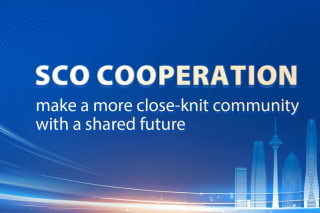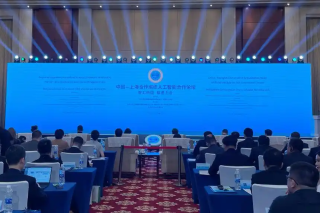Uzbekistan and SCO: Cooperation for global peace and prosperity

Uzbekistan, along with other states, stood at the origins of the formation and strengthening of the Shanghai Cooperation Organization, the role and significance of which are becoming more visible and important with each passing year. Today its activities affect not only the development of member states, but also the well-being of everyone living in this vast region.
Before moving to the issues of SCO cooperation, I want to dwell on our strategic partnership with China — a country that is extremely close to Uzbekistan in spirit, culture and vital energy.
In recent years, Uzbek-Chinese relations have demonstrated high dynamics, covering key areas from political dialogue and security to comprehensive trade and economic cooperation, cultural and people-to-people exchanges. Their consistent strengthening contributes to ensuring stability and sustainable growth in Central Asia and the SCO space.
An important factor in deepening bilateral cooperation is the regular political dialogue of the heads of the two states. In January 2024, during my state visit to China, President of China Xi Jinping and I elevated our relations to an unprecedentedly high level of all-weather comprehensive strategic partnership for a new era, and identified key areas of cooperation and interaction in the international arena.
This unprecedented progress in our relations has become possible due to the personal attention and tireless efforts of our dear friend — President Xi Jinping — to further develop and strengthen Uzbek-Chinese comprehensive cooperation. The implementation of all our agreements is ensured by the mechanisms of the Intergovernmental Committee, the Inter-Parliamentary Group and the Strategic Dialogue of Foreign Ministers.
Strengthening mutual political trust and strategic partnership is facilitated by full understanding and consideration of each other's fundamental interests. Uzbekistan firmly adheres to the one-China principle. We are grateful to China for supporting Uzbekistan's efforts to deepen regional cooperation in Central Asia and form the "spirit of Central Asian partnership".
Our countries are also actively cooperating in the fight against the "three forces of evil" — terrorism, separatism and extremism.
Since 2017 bilateral trade turnover increased threefold reaching $14 billion. We aim to increase it to $20 billion in the near future. Over the same period, $24.6 billion Chinese investments were attracted to the country.
An important milestone in the development of industrial cooperation with China was the launch in 2024 of the first enterprise in the country and in Central Asia for the production of BYD electric vehicles, as well as the opening of the Luban Workshop in Tashkent, where Uzbek students acquire modern skills in logistics management and use of information technology.
The Confucius Institutes in Tashkent and Samarkand make a great contribution to the study of the Chinese language and culture in Uzbekistan, upbringing a new generation of Sinologists and specialists with knowledge of the Chinese language.
A significant step toward further deepening people-to-people cooperation was the introduction of a visa-free regime between Uzbekistan and China in June this year. It will facilitate more active and productive contacts between people, and promote business interactions and tourist exchanges.
Today Uzbek-Chinese cooperation is becoming a model of pragmatic and balanced partnership that contributes to the sustainable development of the region and strengthening the position of the SCO as a platform for mutually beneficial multilateral cooperation.
Further developing stable relations between our countries is of particular importance in the context of an increasingly complex international situation. The world system is undergoing profound upheavals. The former order, based on universally recognized norms and principles of international law, is losing its stability.
A large-scale transformation in international relations is accompanied by intensified geopolitical competition and growing conflict potential among major powers, disruption of established balance of power, and the weakening of collective governance mechanisms.
The architecture of global security is becoming less and less capable of coping with increasing volume of challenges and threats, facing a crisis of trust. This leads to even greater fragmentation, which will be difficult to overcome in the near future.
In the world economy, countries are facing rising protectionism, disruptions of traditional supply chains, and the redistribution of production capacities. Competition is intensifying over access to critically important raw materials and technologies, and the struggle for leadership in digital and "green "transformation is increasing. The slowdown of global economic growth, high inflation, and instability in financial markets create additional risks for countries with developing economies, deepening the gap between the centers of global development.
As a result, not only the system of checks and balances, trade and finance, but also the solution of most global problems related to ensuring security, combating poverty, and climate change are under threat.
In Central Asia, the consequences of climate change, food and energy instability are becoming visible challenges, which can become catalysts for large-scale socio-economic upheavals.
Another common challenge is the development of artificial intelligence. Obviously, this is a natural process that cannot be stopped, but our task is to prevent its use for military purposes and transformation into a global threat.
Without any exaggeration, under these conditions the SCO is becoming an attractive and widely demanded model of international collaboration, uniting states on the principles of equality, mutual consideration of interests, and non-interference in internal affairs.
Since its establishment, the SCO has consistently promoted the "Shanghai Spirit" based on mutual trust and benefit, respect for the diversity of civilizations, and the pursuit of joint development. The Organization rejects the outdated concepts of the "Cold War" overcoming zero-sum thinking and the confrontation of civilizations.
The SCO actively promotes and implements the ideas of non-alignment, non-confrontation and nontargeting of third parties, which advocates complete equality of large and small states, achieving consensus through constructive consultations, as well as promoting peace through dialogue and cooperation. This is precisely the source of the Organization's appeal and energy.
The SCO unites states with different political systems, historical and cultural traditions, and levels of economic development, demonstrating the viability of the idea of harmonious coexistence and mutually beneficial cooperation.
Today the SCO's "big family" of 10 member states, 2 observers and 14 dialogue partners, covers a vast space in Asia, Europe and Africa. The total territory of the SCO countries exceeds 60 percent of the territory of Eurasia, roughly 42 percent of the planet's population. The share of Organization's countries in the world GDP reaches about 25 percent.

Copyright ©
Tianjin Municipal Government. All rights reserved. Presented by China Daily.
京ICP备13028878号-35



